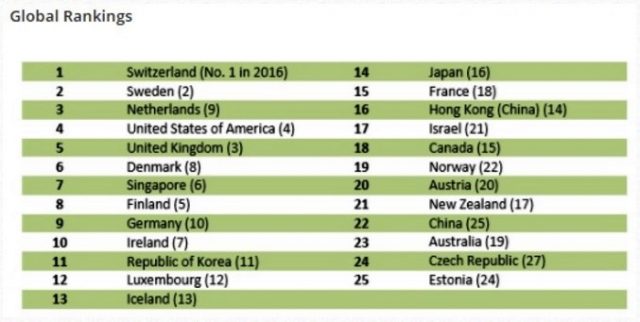Originally posted on NEWSBYTES.PH
MANILA, PHILIPPINES | Unlike the previous year when the country leaped by nine notches, the Philippine only managed to a do little hop this year by moving from 74th place to the 73rd spot in the 2017 Global Innovation Index (GII).
The report, which is released annually by Cornell University, INSEAD and the World Intellectual Property Organization (WIPO), noted that the Philippines led in ICT services exports with the Asean region, although Singapore was the top performer in most of the indicators.
Overall, Switzerland, Sweden, the Netherlands, the US, and the UK are the world’s most-innovative countries, while a group of nations including India, Kenya, and Vietnam are outperforming their development-level peers.
Key findings show the rise of India as an emerging innovation center in Asia, high innovation performance in Sub-Saharan Africa relative to development and an opportunity to improve innovation capacity in Latin America and the Caribbean.
Each year, the GII surveys some 130 economies using dozens of metrics, from patent filings to education spending providing decision makers a high-level look at the innovative activity that increasingly drives economic and social growth.
In a new feature for the GII, a special section looks at “invention hotspots” around the globe that show the highest density of inventors listed in international patent applications.
Now in its tenth edition, the GII 2017 notes a continued gap in innovative capacity between developed and developing nations and lackluster growth rates for research and development (R&D) activities, both at the government and corporate levels.
“Innovation is the engine of economic growth in an increasingly knowledge-based global economy, but more investment is needed to help boost human creativity and economic output,” said WIPO director-general Francis Gurry. “Innovation can help transform the current economic upswing into longer-term growth.”
In 2017, Switzerland leads the rankings for the seventh consecutive year, with high-income economies taking 24 of the top 25 spots – China is the exception at 22. In 2016, China became the first-ever middle income economy in the top 25.
“Efforts to bridge the innovation divide have to start with helping emerging economies understand their innovation strengths and weaknesses and create appropriate policies and metrics,” said Soumitra Dutta, dean of Cornell SC Johnson College of Business at Cornell University.
A group of middle and lower-income economies perform significantly better on innovation than their current level of development would predict: A total of 17 economies comprise these ‘innovation achievers’ this year, a slight increase from 2016.
In total, nine come from the Sub-Saharan Africa region, including Kenya and Rwanda, and three economies come from Eastern Europe.
Next to innovation powerhouses such as China, Japan, and South Korea, a group of Asian economies including Indonesia, Malaysia, Singapore, Thailand, the Philippines and Vietnam are actively working to improve their innovation ecosystems and rank high in a number of important indicators related to education, R&D, productivity growth, high- tech exports, among others.
“We are already witnessing the rapid, worldwide emergence of ‘digital agriculture,’ which includes drones, satellite-based sensors and field robotics,” said Bruno Lanvin, INSEAD executive director for Global Indices.
“Now there is an urgent need for ‘smart agriculture’ to optimize supply and distribution chains and foster creative new business models that minimize pressure on land, energy and other natural resources – while addressing the needs of the world’s poorest.”
“By 2050, the world’s population is estimated to reach 9.7 billion. This presents the global agricultural sector with a daunting challenge. The stage has been set for a potential global food crisis if policy makers and other stakeholders fail to implement agricultural innovation that significantly boosts productivity,” said Barry Jaruzelski, principal at Strategy&, PwC’s strategy consulting business.










